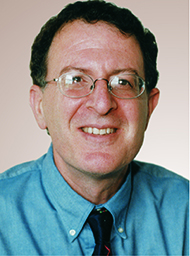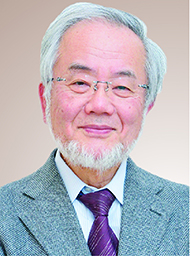The 2015 Keio Medical Science Prize Awardees
Jeffrey I. Gordon, M.D.

Dr. Robert J. Glaser Distinguished University Professor
Director, Center for Genome Sciences and Systems Biology
Washington University School of Medicine in St. Louis
Website
http://gordonlab.wustl.edu/
Reason for Selection
Human gut microbiome and its impact on health and disease
The human gut contains tens of trillions of microbes (the microbiota); their hundreds of thousands of genes (the microbiome) specify functions not represented in the human genome. By pioneering the integration of experimental and computational tools from the genome sciences with interdisciplinary studies of gnotobiotic animal models harboring transplanted gut microbiota from mouse or human donors representing different physiologic or disease states, Prof. Gordon has dramatically altered our views of the microbial origins of health. His work, which has involved studies of children and adults, including twins, representing diverse cultural traditions, has identified how the gut microbiota is established and characterized how its members interact with one another and their hosts. His discoveries of the interrelationships between diet and the gut microbial community have changed our understanding of two pressing global health problems, obesity and childhood malnutrition, and fundamentally altered how the nutritional value and effects of current foods, and future affordable food sources, can be defined in the context of different consumer gut microbiomes. His contributions, which usher in a new era of microbiome-based therapeutics and preventive medicine, are not only evident in his own group's work and his seminal role in spawning microbiome projects worldwide, but in his mentorship of his students, many of whom have become leaders in this field.
Background
- <Education>
- A. B.‐1969
- Oberlin College
- M.D.‐1973
- University of Chicago
- <Training>
- 1973‐1974
- Intern, Medicine, Barnes Hospital, St. Louis, Missouri
- 1974‐1975
- Junior Assistant Resident, Medicine, Barnes Hospital
- 1975‐1978
- Research Associate, Laboratory of Biochemistry, NCI, NIH
- 1978‐1979
- Senior Assistant Resident, Medicine, Barnes Hospital
- 1979-1981
- Fellow in Medicine (Gastroenterology), Washington University
<Appointments (all at Washington University in St. Louis)>
- 1981‐1984
- Assistant Professor of Medicine (Division of Gastroenterology)
- 1982‐1984
- Assistant Professor of Biological Chemistry
- 1985‐1987
- Associate Professor of Medicine and Biological Chemistry
- 1987‐1990
- Professor of Medicine and of Biochemistry and Molecular Biophysics
- 1991‐2004
- Alumni Endowed Professor (1991-2002) and Head, Dept. Molecular Biology and Pharmacology
- 1994‐2003
- Chair, Executive Council, Division of Biology and Biomedical Sciences(position oversees all graduate education in the biological sciences)
- 2002‐present
- Dr. Robert J. Glaser Distinguished University Professor
- 2004-present
- Director, Center for Genome Sciences and Systems Biology
Comments
I thank the Selection Committee for this wonderful award. I am fortunate to work alongside students and colleagues committed to identifying new ways to enhance the nutritional health of infants, children and adults, living in different parts of the world, by studying the interrelationships between our gut microbiomes and diets. Studies of the microbiome are allowing us to see ourselves as intimately connected to the microbial world, prompting us to consider another dimension of our human biology and evolution, and inspiring us to be better stewards of our precious microbial resources.
Yoshinori Ohsumi, Ph.D.

Honorary Professor, Frontier Research Center, Tokyo Institute of Technology
Reason for Selection
Elucidation of molecular mechanism of autophagy
The cellular system which appropriately degrades and processes intracellular proteins is essential to maintain life. Prof. Yoshinori Ohsumi was the first person in the world to elucidate the molecular mechanism of autophagy, which is the phenomenon of cells degrading their cellular components and subsequently reusing them, by the use of yeast genetics approach. Prof. Ohsumi identified the 15 APG genes, which are now called ATG genes, involved in autophagy in yeast and characterized their functions and biological significance. This seminal study was the impetus that led to an explosion of research in the field of autophagy. It was discovered that most ATG genes are conserved in animals, including mammals. ATG gene disruption in higher eukaryotes has revealed that autophagy plays major roles in development, bacterial infections, antigen-presentation and diseases, such as neurodegeneration and cancer. Prof. Ohsumi's brilliant study of autophagy has thus emerged as a central theme in cell physiology and medicine. Prof. Yoshinori Ohsumi's continuous contributions to the field of cell biology, makes him well deserving of the Keio Medical Science Prize.
Background
<Education>
- 1963
- Undergraduate Student, College of Arts and Sciences, The University of Tokyo
- 1967
- Graduate Student, Department of Biochemistry, College of Arts and Sciences,The University of Tokyo, with Prof. K. Imahori
<Academic Carrier>
- 1967
- Graduate Student, Department of Biochemistry, College of Arts and Sciences,The University of Tokyo, with Prof. K. Imahori
- 1972
- Research Fellow, Department of Agricultural Chemistry, Faculty of Agriculture, The University of Tokyo
- 1974
- Postdoctoral Fellow, Rockefeller University with Prof. Gerald M. Edelman
- 1977
- Research Associate, Department of Biology, Faculty of Science, The University of Tokyo, with Prof. Y. Anraku
- 1986
- Lecturer, Department of Biology, Faculty of Science, The University of Tokyo
Associate Professor, Department of Biology, College of Arts and Sciences, The University of Tokyo
- 1996
- Professor, Department of Cell Biology, National Institute for Basic Biology, Okazaki Professor, The Graduate University for Advanced Studies
- 2009-present
- Professor, Frontier Research Center. Tokyo Institute of Technology
- 2014- present
- Honorary Professor, Tokyo Institute of Technology
Comments
It is a great honor for me to receive The Keio Medical Science Prize 2015. I have been working on autophagy, an intracellular degradation system, for more than 27 years by using yeast. Identification of the genes in yeast responsible for autophagy changed the research. It is becoming clear that autophagy plays an important role in a variety of cellular events and is related to certain diseases. It has been a great pleasure for me to share many exciting findings with my very talented colleagues. I would like to express my sincere thanks to all of them.
